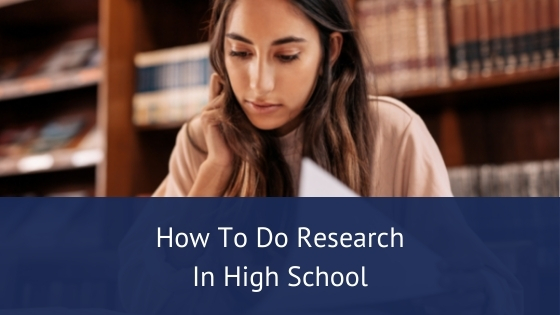The common perception is that research is a serious thing undertaken by serious people; academics in lab coats poring over beakers, writing equations on whiteboards, and shouting eureka. This image, while entertaining, is far from reality.
In this article, we’ll show you the different kinds of research, explain how you can begin getting involved with them as a high school student, and cover what the end goals of the research are. While there are numerous fields of research, not all of them will be accessible to you, though there are still myriad research options available to you, both independently and collaboratively.
Fields of Research
Some fields lend themselves to research more easily than others, especially for high school students. That said, most fields will have openings for students to involve themselves in some capacity. Here, we’ll discuss a few popular ones and a few which are likely unattainable for students in most circumstances.
Popular research fields include biology, chemistry, and related topics in the medical field, especially for students who want to be pre-meds. Sociological fields, including political science and economics, are less popular but still well represented.
Math and physics are much harder to get involved with as a high schooler, especially in any meaningful way. Students interested in business and economics usually find other ways to get involved. Archaeology usually isn’t an option due to safety concerns. Finally, some fields don’t offer the kind of research easily done by high school students, such as philosophy.
While you may not find research opportunities directly related to the field you want to explore, you can still find ways to involve yourself. If you are interested in the sciences, however, we do recommend trying to get involved with research, as that stands out on a resume.

Joining a Research Team
The simplest way to get involved in research as a high school student is to join an existing research project. Every college and university has lab facilities because all faculty are required to conduct research and publish it as part of their job description. This does not mean every school will have a place for high school students who wish to participate in research, but universities are a good place to start looking.
Once you have determined the fields you are interested in, your next step is to look into what research is currently ongoing at institutions near you. Universities are good places to start, as commercial labs are harder to find places in as a student, though some have internship opportunities. Look into ongoing research projects and the professors or graduate students leading them.
Once you have located a project you want to work on or a professor you want to work with, you’ll need to take the leap of reaching out to them. Our article on internships explains how to reach out to find these positions.
Progressing In Research
When you first begin working in a lab or with a professor, the duties you will be assigned will likely feel both dull and repetitive, and will not match the excitement you may expect from research. There are two things you need to know: first, while you will likely progress to doing more independent research if you stick with it, nobody begins their time in a lab by directing experiments. Second, almost all research requires long periods of boredom before achieving (if you’re lucky) an interesting result.
The way you will progress in these positions is by learning all you can. This comes in two forms: first, learning the actual techniques used in research, the physical methodology scientists and professors use to conduct it. Second, by learning what questions to ask, and why. Research occurs when you ask an interesting question, and strive to find an answer no one has found before.
As a final important note on academic research: it is often very boring. Even the most exciting projects; astronomy in Antarctica, excavating long lost cities in the Middle East, digging up dinosaur bones in Outer Mongolia, feature long periods of tedious and repetitive work. There are flashes of excitement and discovery, but don’t expect all research to be fast-paced and flashy. Good research takes time, and a willingness to commit to doing it right. Discoveries aren’t marked with a shout of “Eureka!” but rather an investigator examining data and remarking “Well that’s odd.”
This is not meant to discourage you from doing research; on the contrary, it can be one of the most rewarding things you do. The point is to set your expectations, so you enter forewarned.
Independent Research
Of course, you may not have the access or inclination necessary to join an active research project. In this section, we’ll discuss how you can go about conducting research on your own. While the questions you ask and the answer may be smaller in scope and scale than those done in professional labs, amateur researchers can still make important contributions to science.
You should know that it is easier to do independent research in the hard sciences than in social sciences or humanities (for example, doing archaeology alone is considered grave-robbing, and is frowned upon). This is not to say it is impossible, but that the resources available to high school students allow for easier explorations in some fields than others.
Doing research on your own is difficult due to limited resources, and sometimes due to limited knowledge. That said, there are still many contributions you can make. You simply need to scale the projects you take on with the resources and knowledge you have; the more you learn, the more you are able to learn.
The end goal for most research is either publication or submission into a science competition of some kind. While it is entirely possible to just do research for the joy of having done it, having it reviewed and verified by others makes your accomplishments more credible, and easier to weigh. Which science fairs you enter should reflect the scale and scope of your research, as well as its field. More minor or harder to sum up results may work better as a publication, while engineering projects are often better suited to science fairs or competitions.
An easy place to begin if you are aiming for publication is Negative Results research. Repeating an experiment done previously, scrupulously following their methodology, and acquiring negative results, is an important part of the scientific process. Negative results indicate that more research will need to be done on a topic and that the question may not be as closed as previously thought.
Due to the priorities of grants, however, most university labs do not devote many resources, if any, to redoing experiments to find negative results. This makes it a good niche for students who want to do independent research. Look for experiments done in the past few years, in subjects you’re interested in, with setups you can replicate at home. If you can’t find the full text of an article, reach out to the authors; scientists love discussing their work, and most will share the full paper for free if you ask.
Be sure to thank anyone you contact for their time and effort spent, and if they seem especially friendly, you should ask if the original researchers have advice for your own attempts at negative results. While they may not always be able or willing to devote time to helping you, most scientists enjoy encouraging others to involve themselves in their field.
If you do produce negative results, or if your experiments in another area do so, you can submit them to All Results Journals, which are dedicated to publishing negative results as well as positive ones. Negative results add to the pool of general knowledge by showing what can’t be done or at least can’t be done in a specific way. This prevents future researchers from wasting time by making the same mistakes.
Final Thoughts
Doing the research yourself and publishing it may feel daunting, but scientific discovery is open to all. Further, just because you aren’t directly working with scientists in a lab, doesn’t mean you can’t reach out to them. You should reach out to scientists and professors who have written papers similar to the questions you are working on, both to get their advice, and for networking opportunities. You can use the same email guidelines as asking for an internship, though instead of asking for a lab placement, you are looking for advice, guidance, or merely access to their papers.
If you would like help with reaching out, or have other concerns about doing research on your own, schedule a free consultation with us. We have a long experience helping students find and explore their academic passions, and would be happy to help you discover yours.








